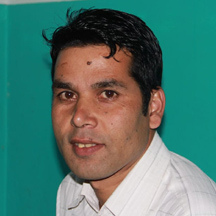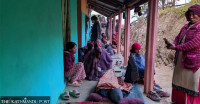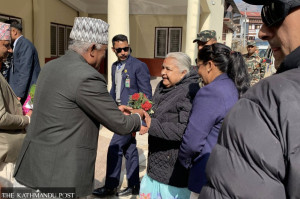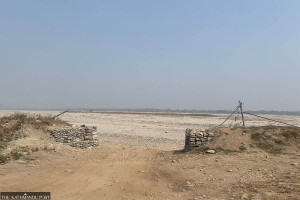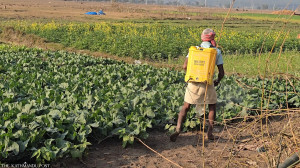Koshi Province
Remote Ghunsa residents suffering from Covid-19-like illness
Situation is under control, says the only health worker serving the area.Ananda Gautam
In the second week of May, 59-year-old Pembaphuti Sherpa of Ghunsa in Ward No. 6 of Phaktalung Rural Municipality was taken ill with a headache. In the next few days, she developed a common cold, fever and diarrhoea.
Pemba’s husband called the auxiliary health worker from the Health Service Centre at Ghunsa. The health worker examined the patient and gave her medicines for fever and diarrhoea.
The patient’s oxygen level was at 77 and she was kept on oxygen support for more than two weeks at her home.
It has been 17 days since the health worker’s visit and the patient is slowly recovering but what plagues her is that she doesn’t know what illness she is suffering from.
“I can sit and talk on the phone but I don’t have the energy to stand up or walk around,” Pemba told the Post over the phone. “My husband also fell sick with similar symptoms within a few days of my falling ill. But we don’t know what is ailing us.”
So far, 54 individuals have taken ill with similar symptoms in Ghunsa since the start of May.
Currently a total of 42 families live in the Ghunsa area.
Majority of the patients have recovered now, says Prabin Rai, the health worker who had visited Pemba. “Only four to five patients are still unwell. The situation is under control.”
Rai is the only health worker in all of Ghunsa.
According to Rai, he has visited families individually and provided treatment to the patients. “I had informed the rural municipality about the spread of a disease similar to Covid-19. But the local people of Ghunsa were hesitant to get tested because of the stigma attached to Covid-19 especially in the rural areas,” he said.
“Since the last two weeks, I have been busy measuring the oxygen level of patients, putting patients on supportive oxygen and doing follow-ups,” he said. “It’s difficult to manage all of Ghunsa’s population but we can’t take chances with people’s health especially during a pandemic.”
Tsheten Dondo Sherpa, a resident of Ghunsa, says he does not want to be ostracised by society for carrying the coronavirus. “Many people in my village don’t want to be branded as a Covid-19 patient. People will shut you out.”
Six months ago, a health service centre was established in Ghunsa, a settlement at an altitude of 3,100 metres, according to the data of the local Ghunsa Foundation. Yangjom Sherpa is the chairperson of the foundation.
Prime Minister KP Sharma Oli had inaugurated the health centre in Ghunsa on December 23, 2020. Sherdhan Rai, Chief Minister of Province 1, among other government officials had also attended the inauguration.
In December, 2020, Sherpa had managed oxygen cylinders, oximetres and other medical supplies for Covid-19 patients in Ghunsa. “The authorities and local organisations have been very vigilant of the situation at Ghunsa. A dispatch of essential medicines was sent by Sherpa some five days ago,” said Rai.
It takes three days on foot to reach Ghunsa from Phungling, the district headquarters of Taplejung. Topethok, the administrative centre of the rural municipality, is a walking distance of two days. The remoteness of the area has deprived the local people of basic health care. “We are deprived of all government services because of Ghunsa is a remote place. This has never been more true than now.”




 11.84°C Kathmandu
11.84°C Kathmandu